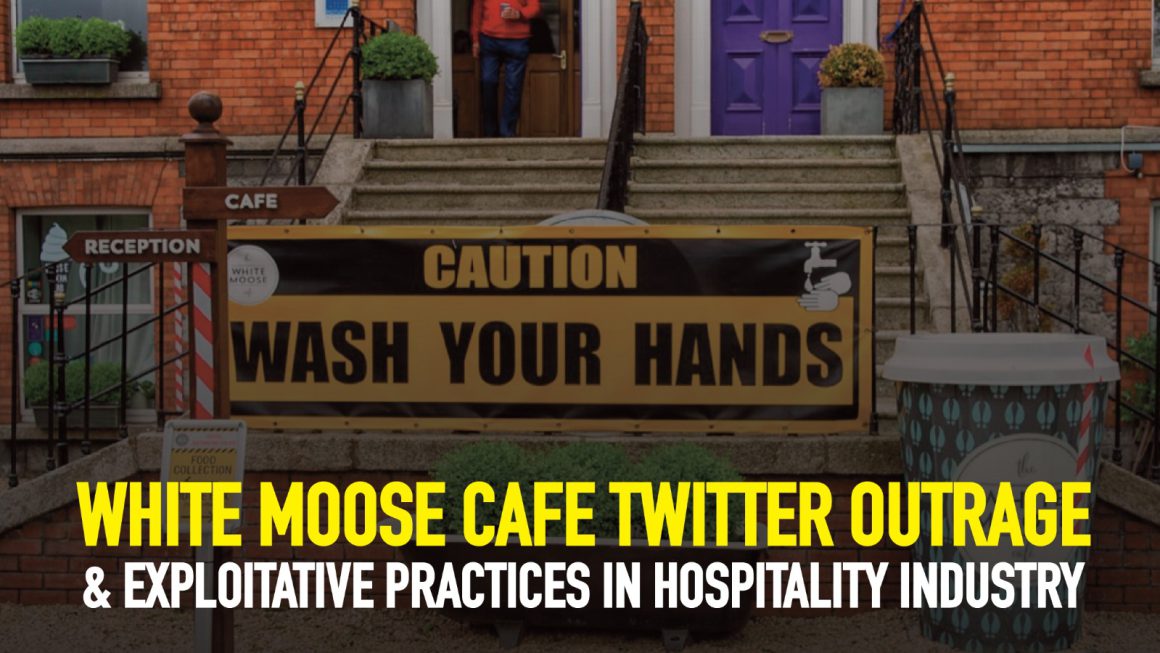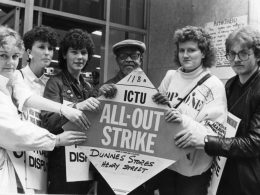By Dan O’Rourke
The White Moose Café in North Dublin, and it’s owner Paul Stenson, have recently been the focus of another round of social media outrage. This time for alleged exploitative work practices, as well as the usual deliberately inflammatory social media posts. Stenson is infamous for deliberately provocative outbursts on social media.
On Tuesday 4 May, coordinated updates from the cafe’s social media accounts complained about the difficulty of hiring hospitality staff – blaming the Pandemic Unemployment Payment (PUP). Tired right-wing tropes characterizing people as living off taxpayer money were thrown in for good measure. This calculated rant moves beyond parody with the knowledge that Stinson inherited the establishment from his parents.
Stenson’s practice of generating publicity by utilising social media’s tendency to favour outrage is openly acknowledged. He runs ‘Outrage Marketing’ workshops to demonstrate the dirty PR practices to other business owners.
Following his most recent campaign, a number of former workers have come forward with allegations of a range of horrible exploitative practices. Although this article falls into the trap laid by Stenson, now that the dust has settled it is worth examining the allegations to serve as an example of the exploitation that is rife in the broader hospitality industry.
Exploitative practices in hospitality
While the alleged exploitative practices reported on Twitter have gotten a lot of attention for this one particular cafe, they are par for the course in the hospitality industry. Each of these methods is geared towards getting the most work for as little wages as possible.
The following is an unfinished list of subtle and not so subtle tactics of exploitation that keep profits flowing off the back of underpaid and overworked employees.
- Deliberate understaffing.
The fewer workers on, the lower the wage bill. It also means a much higher level of intensity and stress for employees. - Cursing and abusive language.
When the “we’re all a family here” guilt trips stop working, many bosses revert to aggression in order to intimidate workers and get them to back down from legitimate grievances. - Reliance on unemployed people and precarious contracts as a threat.
Phrases such as “Other people would be happy to take your job. They’d probably complain less” will be familiar to many in hospitality. - No extra wages for working extra hours.
Working through lunch breaks, or staying late on a busy day without being paid for the extra hours is of undeniable benefit to the business owner. - Exploitation of immigrant workers.
Language barriers, bigotry, and knowledge barriers allow bosses to further exploit immigrant workers. - Sexual harassment.
This is a massive problem in the wider hospitality industry (although no such allegations have been made about the White Moose Café). Harassment means workers are more afraid to speak out. - Tip theft.
The fact that workers have to rely on tips is bad enough without this money being stolen by bosses.
Findings from a 2019 study highlight the weight of exploitation faced by hospitality workers. A massive 76% of respondents said they experienced verbal abuse. Over half said they don’t get the breaks they are entitled to, and 55% said they had witnessed or experienced harassment based on sexuality, age or race. Another 48% said they felt they had no voice or access to union representation
Age old problem
Whether it’s a small inherited establishment, or a massive international corporation, capitalists rely on exploitation in order to turn a profit. The laws of competition mean a business has to work you as hard as possible, for as long as possible, for as little money as possible, in order to maintain its profits.
The only solution to exploitation that has ever worked is when workers organise and fight back with the same level of determination and coordination as the bosses have. The trade union movement must step up to this task and organise a fightback against exploitative and precarious working conditions.












